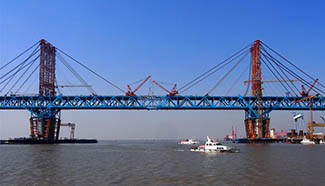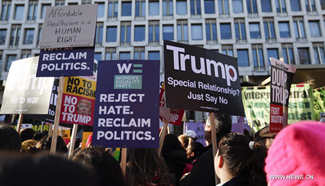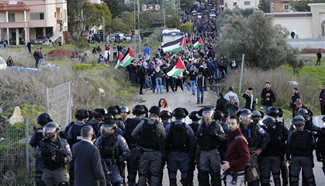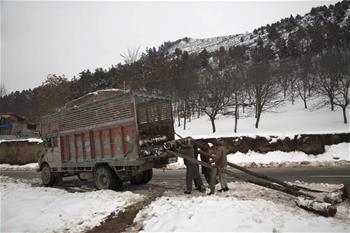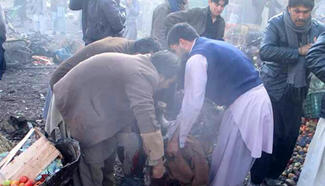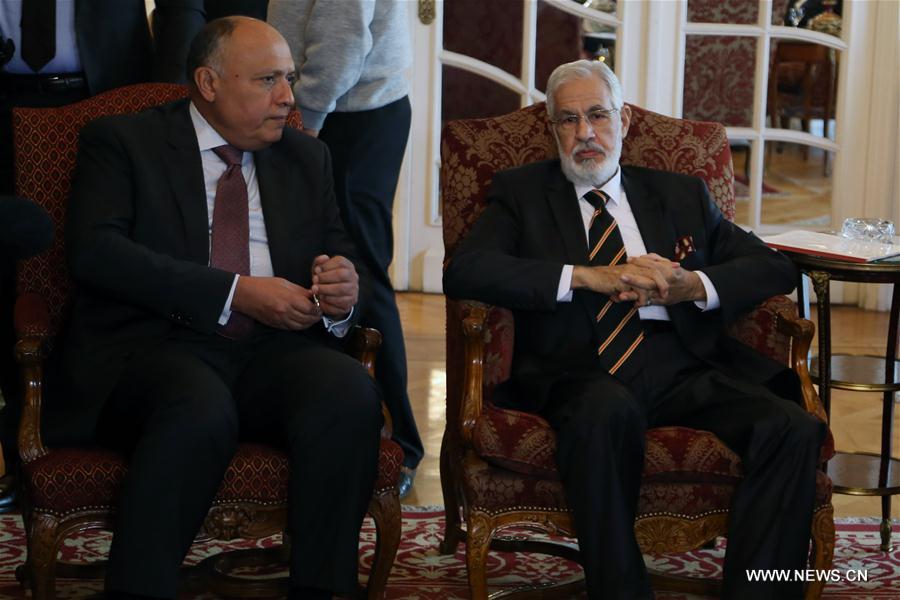
Egyptian Foreign Minister Sameh Shoukry (L) and Libyan Foreign Minister Mohamed Taher Siala attend a ministerial meeting of countries neighboring Libya, which aims at finding solutions for the political and economical turmoil in Libya in Cairo, Egypt on Jan. 21, 2017. (Xinhua/Ahmed Gomaa)
CAIRO, Jan. 21 (Xinhua) -- The foreign ministers of Libya's neighboring countries met in Cairo on Saturday and urged dialogue as the only solution to put an end to the North African country's crisis.
The meeting was led by Egyptian Foreign Minister Sameh Shoukry and attended by Arab League (AL) Secretary-General Ahmed Aboul-Gheit, UN Envoy to Libya Martin Kobler, as well as representatives from Libya, Sudan, Algeria, Chad, Niger and Tunisia.
The final communique of the meeting reiterated rejection of any military action or foreign military interference in the war-torn state, underlined the importance of cooperation among Libya's neighbors in border security and agreed to hold their 11th meeting in Algeria, but the date has not yet been decided.
Shoukry stressed in his speech at the 10th ministerial meeting of Libya's neighboring countries that Egypt is committed to Libya's sovereignty and will always support its legitimate institutions and reject any interference in the country's affairs.
He explained that a political solution is the only way to resolve the Libyan crisis and that Libya's neighbors are exerting efforts to bring Libyan leaders together for a direct dialogue to build mutual confidence and understanding.
"The Skhirat Agreement is the perfect solution to the Libyan crisis. The agreement guarantees effective participation of all Libyan parties with the aim to put an end to the current crisis," Shoukry said.
After the ouster and killing of former Libyan leader Muammar Gaddafi in 2011, Libyan factions engaged in a state of civil war that escalated in 2014 and resulted in splitting power between two rival governments in Tripoli and Tubruk.
Tubruk government was recognized by the international community then, before the Libyan Presidential Council (PC) established in late 2015, which was formed as a unity government following an UN-brokered peace deal between warring Libyan factions reached in Skhirat, Morocco.
Supported by self-proclaimed Libyan national army led by Marshal Khalifa Haftar, the parliament-backed government in Tubruk refuses to recognize the UN-backed, Tripoli-based unity government run by the PC.
The Egyptian foreign minister said that Libya's neighboring countries were affected by the Libyan crisis and its implications, including terrorism, organized crime, illegal migration and drug smuggling.
"Terrorism in Libya will be eliminated only through the political settlement which allows the re-establishment of Libyan state institutions and the support of the Libyan army and police forces," Shoukry added.
For his part, Libyan Foreign Minister Taher Siala commended Cairo's efforts to host the meeting and find a mechanism for a direct dialogue between Libyan conflicting parties.
He elaborated on the PC's ongoing efforts for comprehensive reconciliation including all parties "so that they all contribute to the reconstruction of their nation."
Siala invited all states, particularly neighboring ones, to reopen their embassies in Tripoli as part of the unity government's efforts to restore diplomatic representation in the capital city.
"The Government of National Accord (GNA) is still suffering challenges as some states deal with parallel entities while the GNA is the legitimate entity according to international resolutions," said the Libyan minister.
Algeria's Minister for Maghreb, Arab and African Affairs Abdelkader Messahel stressed that the Libyans are the only people who can reach a solution for their country's crisis.
He also hailed the efforts exerted by the UN envoy to Libya and called on the international community to continue support for the UN efforts to bring the Libyan factions together to the negotiation table.
The AL, which has recently hired an envoy to Libya, reaffirmed commitment to its responsibility towards the Libyan people and to maintain security and stability of the Arab country.
"The AL encourages rivals in Libya to reach an inclusive policy under Skhirat Agreement and would continue backing legitimate institutions in Libya to overcome challenges at the levels of security, politics and economy," said AL chief Aboul-Gheit during the meeting.
He added that his organization will intensify contacts with the PC, the unity government and the parliament in Libya, alongside key political actors, to resolve the main causes of disagreements between rival parties.
The state of civil war in Libya was sparked after Gaddafi's fall by the western intervention via a no-fly zone and bombings and their military support to the anti-Gaddafi rebel forces.
Egypt has been hosting high-profile talks between Libyan parties including head of Libya's unity government Fayez Serraj and head of the Libyan parliament Aqila Saleh in an attempt to resolve the political deadlock in the conflict-stricken country.




